Ask our dispensing optician
Your request was successfully submitted!
How to Improve Vision

Reviewed by
Beck Jinnette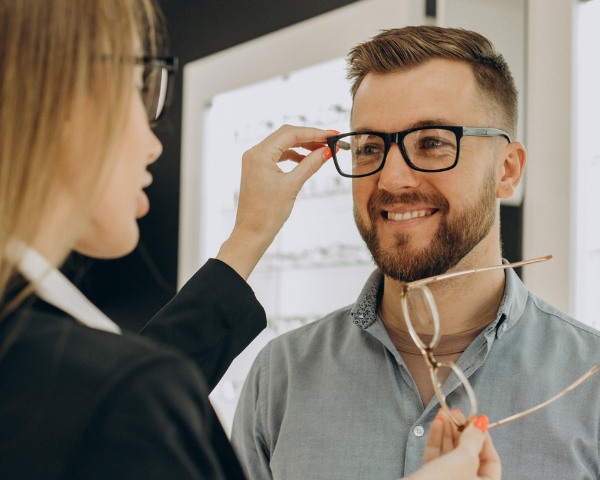
Good eyesight is one of the most important gifts one can have. Unfortunately, many people don’t realize just how precious it is until they begin to experience vision problems.
That’s why it’s so important that you learn about improving your eyesight now, before it’s too late.
Risk factors and common eye health problems
Your eyes play a critical role in your daily lives, so taking care of them is extremely important. However, eye health problems aren’t always avoidable.
Some people may develop issues due to family history, meaning they’re more likely to contract a specific condition because of genetics.
Age may also be a factor in other eye conditions that can cause severe damage but are not a natural part of aging.
These conditions can often be treated or slowed. However, they may lead to significant vision loss if not detected early.
Other risk factors include chronic health conditions, such as diabetes or high blood pressure. Additionally, studies have shown that certain ethnicities may have a higher risk for developing particular eye problems.
These risk factors make it essential to get routine eye exams and to be aware of what can put you at risk and what symptoms to look out for. Being proactive in this regard can help maintain your eye health now and in the future.
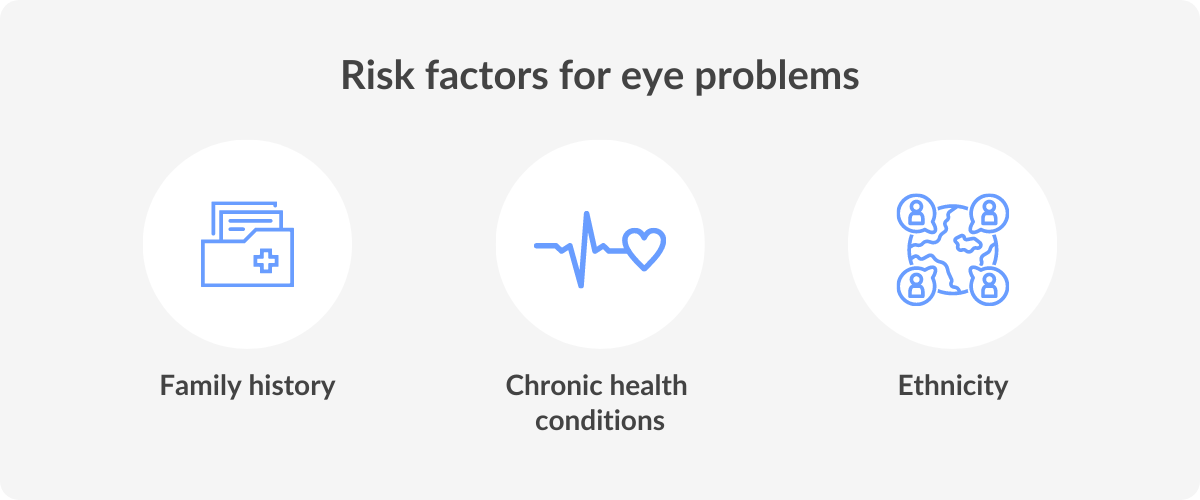
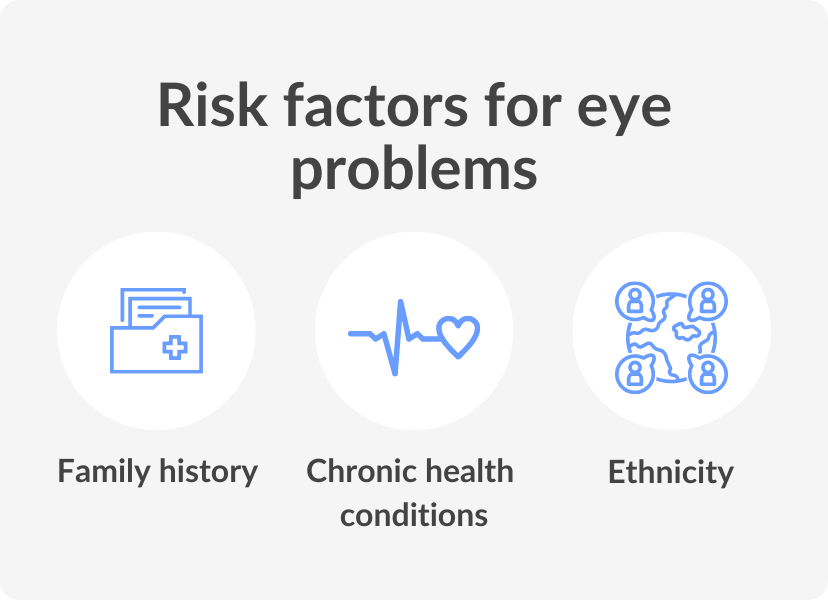
Top tips to improve your eyesight naturally
In this section, we’ll go over practical tips and advice on improving eyesight and potentially slowing damage that may have already occurred.
Know the importance of diet and lifestyle
Taking care of your eyes is essential and it all starts with diet and lifestyle. Consuming foods rich in omega 3 fatty acids, such as salmon and walnuts, can help improve healthy eyes and sight.
Including leafy greens like spinach and kale, which are rich in lutein and zeaxanthin, adds further protection for your eyes.
Maintaining a healthy weight is also important, as obesity has been shown to increase the risk of diseases like cataracts and glaucoma that cause vision loss.
Vitamins A, C and E, as well as carotenoids, are essential for healthy vision. These nutrients can be found in colourful fruits and vegetables like carrots, oranges and bell peppers.
In general, eating the rainbow and a diverse range of fruits and vegetables is very beneficial. Regular eye check-ups with a healthcare provider can help detect any underlying issues early on, allowing for timely intervention.
Avoiding smoking is crucial, as it has been linked to several vision-related problems, including macular degeneration. Hydration, too, plays a vital role, as dry eyes can become a significant discomfort if not addressed through proper fluid intake.
By incorporating these nutrients into your diet and making good lifestyle choices, you can help keep your eyes healthy and functioning optimally for years to come.
Investing in your eye health now can ensure a lifetime of clear vision, enhancing your quality of life in immeasurable ways.
Get regular eye exams and medical care
Your eyes are incredibly important and they deserve the same level of medical care that you would give to any other part of your body.
Something as simple as an eye exam can help detect early signs of eye diseases, such as glaucoma and age-related macular degeneration, that can lead to permanent vision loss or accelerate vision impairment if left untreated.
During an eye exam, your optometrist or eye doctor will do a full eye health exam to assess not only your vision but all areas of your eye, like the optic nerve.
This is responsible for transmitting visual information to your brain. This examination can uncover issues like optic neuritis, which can be an early sign of more significant health problems.
During an eye exam, your doctor can detect issues that you may not have any symptoms of.
As we age, our vision changes and we may experience eye strain or other age-related vision changes such as presbyopia, which affects our ability to focus on close objects.
Regular eye exams can help prevent or address these issues and ensure that you’re taking care of your eyes to the best of your ability.
Additionally, it’s important to recognize that eye health is linked to overall well-being. Chronic health conditions like diabetes or hypertension can affect the eyes, leading to conditions like diabetic retinopathy.
Proper communication between your optometrist and general healthcare provider can help in managing these health challenges and preserving your vision.
Children also benefit from regular eye check-ups. Early detection of vision problems can have a significant impact on a child’s learning and development. Make sure to get yourself and all the family regular check ups.
Protect your eyes
Your eyes are precious and deserve extra care, especially when it comes to protecting them from the sun’s harmful rays.
When you wear sunglasses it is a simple yet effective way to shield your eyes from UV radiation, which can lead to numerous eye problems and discomfort.
Polarized lenses in sunglasses can also reduce glare, making driving or outdoor activities more comfortable and safe.
And let’s not forget the importance of using lenses to protect our eyes from other potential hazards like debris, dust, wind and even the blue light emitted from screens.
It is key to invest in a good pair of sunglasses. Look for UV400 glasses that block 100% of both UVA and UVB rays for the best protection.
The next time you step out in the sun, whether it’s for a day at the beach or a brisk winter walk, grab your sunglasses to keep your eyes safe and healthy. Your vision is worth the investment.
Follow the 20-20-20 rule
In today’s digital age, we spend countless hours staring at screens, whether it’s for work, leisure, or communication.
However, this habit can take its toll on your eyes, leading to poor vision and discomfort. That’s where the 20-20-20 rule comes in; every 20 minutes, take a 20-second break from your screen and focus on something 20 feet away.
This short break can alleviate eye strain and prevent potential eye damage in the long run. Next time you find yourself glued to your screen, remember to take a quick break and give your eyes the rest they deserve.
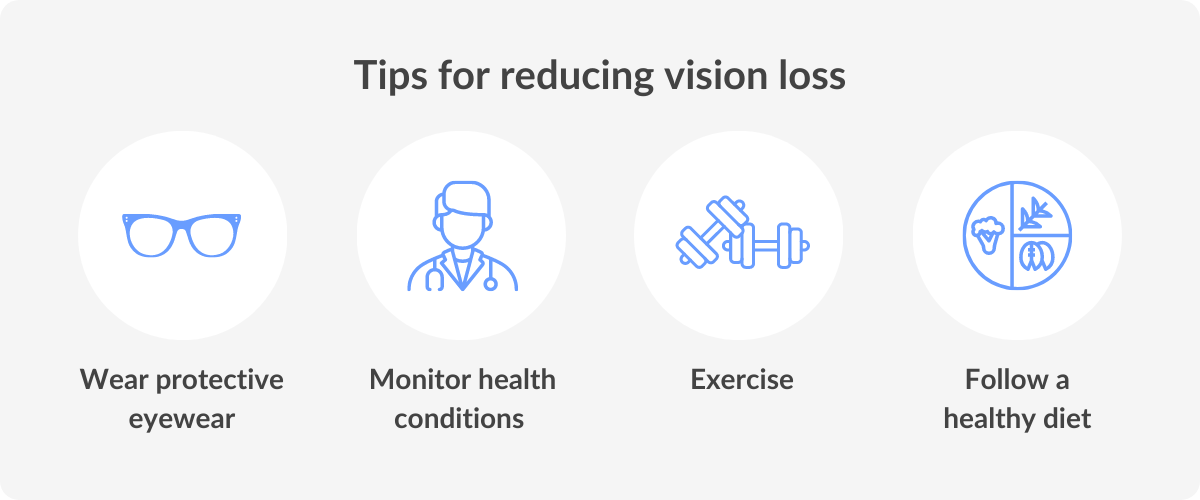
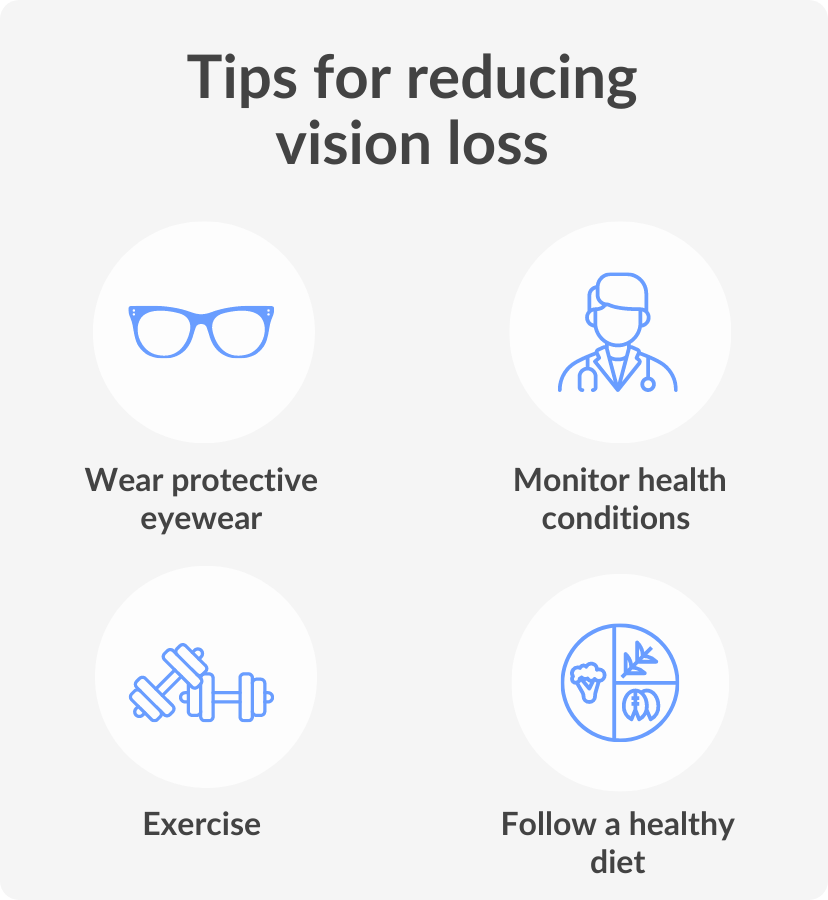
DID YOU KNOW?
Blue light glasses are also something to consider when investing in eye protection. They can block harmful blue light and reduce squinting at your screen.
Know your family's medical history
One of the most important things you can do to protect your health is to know your family’s medical history. Your family’s health history can give you insights into what sort of health issues you might have to contend with in the future.
Eye problems can run in families and knowing your family’s history can help you take steps to protect your vision.
For example, if you have a family history of glaucoma, you may need to get your eyes checked more frequently as you age. Similarly, if you have a history of cataracts in your family, you might need to start taking steps to protect your vision from an early on.
Take the time to talk to your family members about their health experiences eye-related and otherwise. It could make a big difference to your own health in the long run.
Treatment of eye conditions if problems arise
When it comes to keeping your eyes healthy, early diagnosis is key. This is especially true for eye diseases. If you do experience any symptoms of an eye condition, such as blurry vision or eye pain, it’s important to seek medical attention as soon as possible.
Modern medicine has made incredible strides in the field of ophthalmology, so there are many treatment options available.
Depending on the condition, you may need to undergo eye surgery or simply manage your symptoms with medication or lifestyle changes. Regardless of the specific treatment, the most important thing is to address any eye problems as soon as possible.
If there are no surgical corrections to make, your doctor may prescribe you glasses or contacts to improve your vision.
Importance of healthy vision
Vision is one of the most important senses that we possess. It’s how we perceive the world and navigate your surroundings. Maintaining healthy vision is crucial for overall well-being.
Poor vision can impact our ability to perform daily tasks as well as cause other ailments like headaches, dizziness and fatigue.
Regular eye exams and adopting good habits, such as taking breaks from electronic screens and always wearing your prescription glasses and contact lenses, can help protect your eyes and preserve your vision.
Eye health is invaluable; taking necessary steps to protect it can improve your vision as well as slow genetic and age-related conditions. Visit our Optical Centre for more informative eye care articles.





































